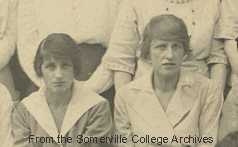In July 1918, Winifred Holtby was beginning her national service having enlisted in Queen Mary’s Army Auxiliary Corps. Like Vera Brittain three years earlier, she had found it impossible to continue her studies at Somerville but her enlistment in the QMAAC had to be done surreptitiously, under cover of a visit to relatives in London. The Principal of Somerville, Emily Penrose, was concerned at the loss of students to war work and in June had once again addressed the college on National Service. On 3rd July 1918, she explained her concerns more fully, to an audience of candidates in Oxford to take Responsions (a qualifying examination for degree courses).
The War Office authorities had visited the heads of the women’s houses to inform them of an imminent national recruiting campaign for the QMAAC. Asked to address prospective candidates on the subject, Emily Penrose relayed not just the facts of the recruitment drive but also the opinion of the women’s colleges. The QMAAC was looking to recruit 15,000 women to work as cooks, waitresses and clerks. There was also a demand for 30,000 women to work the land. The call to national service was not new, having faced students since the beginning of the war, and Emily Penrose explained the college perspective.
 To students in the middle of their courses, she urged, “Take the long view. Ought [you] to do it at the risk that next year or the year after there may be a shortage of fully trained servants of the State that cannot then be supplied? Is it best to give the State half-trained [servants] now or fully trained [servants] then? You cannot do both.” She went on to note that the shortage of trained men was worsening with every year, the immediate need only to be met by those who were already studying, and an Oxford training could not be improvised.
To students in the middle of their courses, she urged, “Take the long view. Ought [you] to do it at the risk that next year or the year after there may be a shortage of fully trained servants of the State that cannot then be supplied? Is it best to give the State half-trained [servants] now or fully trained [servants] then? You cannot do both.” She went on to note that the shortage of trained men was worsening with every year, the immediate need only to be met by those who were already studying, and an Oxford training could not be improvised.
To candidates ready to begin, she stated the importance for the country that a certain number of ‘the most highly gifted women’ should start their training each year. The duty of these gifted women, having obtained a place at a college, was to take up the training and, once qualified, use it to serve their country.
The more difficult problem was for those candidates who did not gain a place or pass the qualifying examination. How to pull their weight during the national crisis? Penrose thought it ‘doubtful whether it is justifiable to spend another year in waiting for a place at a university’.
One of Emily Penrose’s greatest gifts was her ability to take the long view but she was not of the war generation. For many women who were, the logic of Penrose’s arguments could not compete with their visceral response to the national crisis, which rendered the safety and comfort of college life ‘insupportable’.

